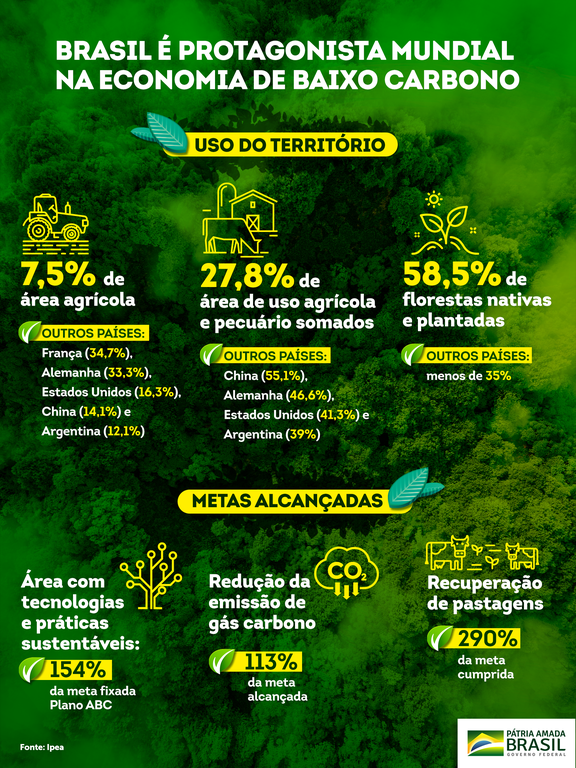ENVIRONMENT
Share: Share via Facebook Share via TwitterLink to Copy to Clipboard
Posted on 04/12/2022 16:35
Brazil combines agricultural production growth with environmental sustainability, says Ipea
Study says that the country stands out as one of the protagonists in the low carbon economy
Over the years, Brazilian agricultural productivity has advanced allied to environmental sustainability. This formula helps the country to stand out as a protagonist in the construction of a low carbon economy. The findings are in the publication Indicators of Productivity and Sustainability of the Brazilian Agricultural Sector, published by the Institute of Applied Economic Research (IPEA).
“Brazil stands out as one of the leaders and protagonist in building a low carbon economy. Based on the indicators analyzed, it was possible to verify the national contribution and the Brazilian effort in sustainable production. There is no doubt that Brazil is an example to stand out in the international context in terms of agricultural production with productive sustainability”, notes the Ipea study.
The low carbon economy is a system that encourages the rational use of natural resources in the quest to have the least possible impact on the environment, reducing or eliminating the emission of greenhouse gases. The reduction of emissions of these gases is foreseen in goals assumed by Brazil in international agreements.
According to the study, Brazil has been continuously increasing its agricultural productivity and, at the same time, managing to stand out in the low-carbon economy and preserve it, due to the improvement of the productive technical efficiency indices in the sector.
Brazilian agricultural production per unit of greenhouse gas emissions has also been growing over the past two decades, according to the study. That is, production increases while the emission of carbon dioxide in the atmosphere decreases.
The text also mentions that the country is one of the few in the world that has implemented stricter rules on land use and conservation areas. “Brazilian legislation has the potential to boost the efficient use of productive resources and become an effective instrument for environmental sustainability”.
The Ipea publication records that the expansion of the agricultural production area with sustainable technologies and practices reached 154% of the target set in the Sectorial Plan for Mitigation and Adaptation to Climate Change for the Consolidation of the Low Carbon Emission Economy in Agriculture (ABC Plan ). The Plan is a public policy composed of programs with actions to be carried out for the adoption of sustainable production technologies.
The goal of mitigating the emission of carbon dioxide (CO2) in the atmosphere, one of the causes of the greenhouse effect, was also exceeded and reached the equivalent of 113%.
The ABC Plan's actions involve the adoption of integrated crop-livestock-forestry systems, the incorporation of the no-tillage system, biological nitrogen fixation, expansion of the planted forest area, as well as the treatment of animal waste.
Preservation of forests
The IPEA publication brings another piece of data that demonstrates the country's commitment to sustainable development. It is the preservation of native forests. According to the text, Brazil is the country that managed to preserve the largest extension of native forests within its territory, about 57.2% or practically all of its area destined for forests. With regard to planted forests, Brazil still contributes 1.3% of its territory.
“The numbers show that Brazil, so far, has preserved a substantial area with native forests, despite the strong agricultural growth and, relatively, with low use of land destined for agricultural production, either with pastures or with agricultural areas” , registers the publication.
According to the Ipea study, in specific terms, the recovery of pastures and the treatment of animal waste are bottlenecks that still persist in Brazil's journey towards low-carbon agriculture.
The IPEA publication aims to summarize the productive framework of the Brazilian agricultural sector in the last 15 years. The study was authored by José Eustáquio Ribeiro Vieira Filho, researcher at the Directorate of Regional, Urban and Environmental Studies and Policies.
Check out the publication Indicators of Productivity and Sustainability of the Brazilian Agricultural Sector here.
Category
Environment and Climate
Tags: EnvironmentIpeaAgricultural ProductionEnvironmental Sustainability
.

 Mr. Alessandro Jacob speaking about Brazilian Law on "International Bar Association" conference
Mr. Alessandro Jacob speaking about Brazilian Law on "International Bar Association" conference